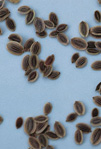

Dill “seeds,” actually fruits.
WHEN I THINK OF DILL, I think of dill pickles. One of the best-known uses of this ancient herb in modern Western societies is for flavoring pickles.
Dill was also widely appreciated in ancient times, recorded from ancient Egypt and elsewhere. Dill was so valued that it was used as an offering: “Woe to you, teachers of the law and Pharisees, you hypocrites! You give a tenth of your spices—mint, dill and cummin. But you have neglected the more important matters of the law—justice, mercy and faithfulness. You should have practiced the latter, without neglecting the former” (Matthew 23:23, NIV).
Dill, Anethum graveolens, is mentioned in the Bible only in that one spot. While the herb is well known as a component of pickles, dill is widely grown throughout the world and is used to flavor many dishes and sauces. Both the seed and the leaves are used. Dill seed was found in the tombs of Egyptian kings, demonstrating its long use in the Middle East (Vartavan and Amorós 1997). Dill is thought to have evolved in the region (Zohary and Hopf 2000).
It is probably difficult for those of us living in the twenty-first century, with our ready access to herbs and spices from around world, to understand how valuable these condiments were in the ancient world for their power to add flavor and variety to foods—and that they would be so valuable, they were used for tithing.
Flowering dill, Anethum graveolens, in May, near Brumanna, Lebanon. Courtesy Houssam Shaiban.